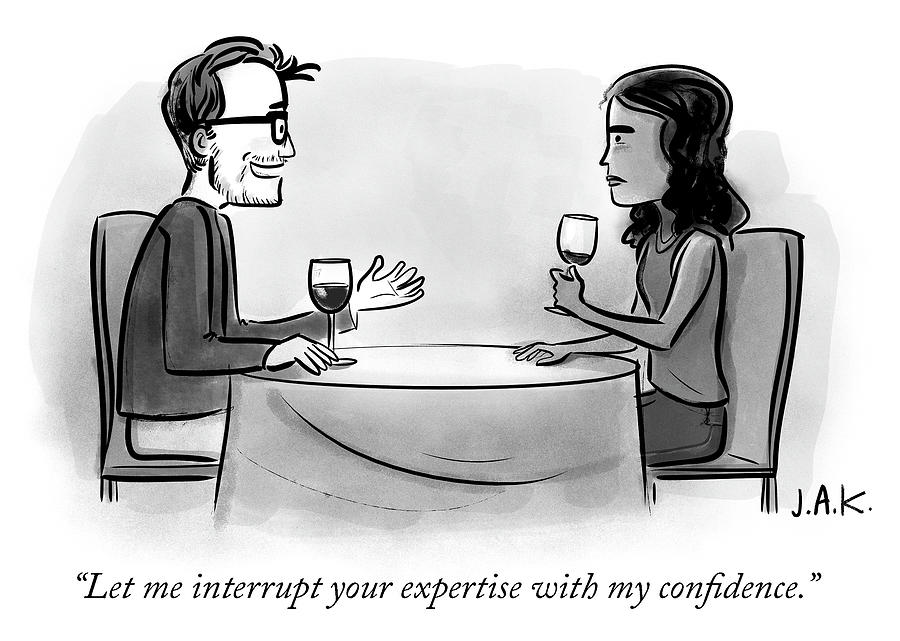Everyday interactions—from interruptions to unsolicited explanations—reinforce gendered power dynamics and make it harder for women to be heard.
Tools of the Patriarchy is a column on the tools that establish men’s dominance in society, or, in other words, uphold the patriarchy. Whether or not these tools are used intentionally, they contribute to a world in which women are not equal to men.
“Sorry, but—”
I paused as the words flew from my mouth, forming an apology before I could even consider why I felt the need to begin my confrontation with one. A moment earlier, my friend had interrupted me during a heated debate, and I wanted to finish making the point I had been in the middle of.
“No worries, it’s all good,” he said with a smile, continuing with his argument. I sat stunned by how in a matter of seconds, I had been interrupted, then enabled to apologize for trying to address the interruption—all with the end result of my friend getting to speak over me.
These types of interactions happen to women all the time. Compulsive apologies, interruptions, mansplaining and emotional weaponization are all barriers that get in the way of women getting their point across, and being heard.
Communicating is already complicated enough, but it is even more difficult as a woman—so let’s talk about it.
Apology Reflex
In 2015, a skit by Amy Schumer went viral for calling attention to the way women overapologize, even when they have done nothing wrong. Titled “I’m Sorry,” the skit follows a panel of impressive women who apologize after the men in the skit make blunder after blunder. These include pronouncing the panelist’s names wrong, bringing one of the women coffee after she asked for water, and watching on as she dies of burns from the coffee.
The skit is overly dramatic, but it gets its point across quite clearly, and as a viewer, it immediately had me questioning why I feel the need to apologize so much.
It turns out, this ‘apology reflex’ is everywhere, and it stems from early childhood. Dr. Stephen Hinshaw, a psychology professor at UC Berkeley, explains in his book, The Triple Bind, that as children, girls are often rewarded for being considerate of others feelings, and expected to be polite and nurturing.

This socialization then transfers into overapologizing as an adult: Women see something wrong and are trained to take responsibility for it to make others more comfortable.
Young boys experience a reverse effect, where they are raised to be assertive and confident, so later in life they don’t feel the need to apologize for things that aren’t their fault (and even sometimes things that are). This double standard can become even more frustrating when we consider that because these roles have played out for so long, men often expect and encourage women to apologize for things they shouldn’t have to, perpetuating the cycle.
This doesn’t mean we should stop apologizing or caring for others, but it does help to ask yourself whether you actually need to apologize, because sometimes choosing not to apologize is an act of feminist resistance.
Conversational Dominance
The gender roles instilled as children do not just affect when people feel compelled to apologize. You could scour the internet for studies about conversational dominance, and they will all say about the same thing: In conversation, men tend to speak and interrupt more than women, and the presumed cause is childhood socialization.
Many women, however, don’t need a study to tell them this—as being interrupted or expected to keep quiet during a conversation is a common occurrence.

Famously, in 2020, former Vice President Kamala Harris was interrupted during the vice presidential debate by former Vice President Mike Pence. She called him out with a firm, “I’m speaking”—but the fact that she had to assert herself in a moderated discussion shows how serious the problem is. Pence interrupted Harris twice as many times throughout the whole debate, and ended up with three extra minutes of speaking time, according to a CBS news tally.
This normalized conversational dominance is everywhere, and it’s hard to combat. While interrupting is pretty easily recognized and addressed, there is at least one other major conversational frustration that’s a little bit trickier.
Mansplaining
Dubbed as a combination of ‘man’ and ‘explaining,’ the term mansplaining first took hold after the release of Rebecca Solnit’s essay “Men Explain Things to Me” in 2008. Although Solnit never explicitly uses the term mansplaining, the essay brought to the forefront an issue women everywhere had been experiencing for ages.
With they mansplain, men subconsciously assume they know more than the woman they are ‘explaining’ to, regardless of her qualifications. It’s often painted as a favor, as if women should be grateful for their explanation, even if it was unprompted, incorrect or towards someone who knows more about the topic. “Mansplaining allows men to treat women as less than without being overt about it,” wrote Kathleen Trigiani and Riley Holden in 2015. “It sends the message to women that our opinions don’t matter … that voice is male.”
Mansplaining reflects patriarchal assumptions that position women as less knowledgeable and in need of male guidance. “Most women fight wars on two fronts,” according to Solnit, “one for the topic … and one simply for the right to speak … to have value, to be a human being.”
Like the other communicative double standards we’ve discussed, the frequency of mansplaining can be attributed to childhood development: The same confidence and assertiveness that cause men to apologize less or dominate a conversation also make them feel comfortable giving unsolicited advice.
Mansplaining can be difficult to identify and address because it is often framed as helpful or well-intentioned, unlike interruptions, which are more readily observable.
What About When Things Get Heated?
Confronting any sort of communication double standard is difficult, because it often means calling someone else out, which can be uncomfortable—especially if they aren’t aware of their actions. It’s even more challenging when we consider how women are perceived when they contradict or confront men.
A 2022 study examining perceptions of emotional expression in arguments found that when women were told to “calm down,” participants rated their arguments as less credible. The same phrase directed at men had no significant effect. This suggests that perceptions of women as emotional can undermine how their ideas are evaluated.
The study reflects broader gendered patterns in how emotional expression and confrontation are perceived. Terms like “crazy,” “bossy,” “bitchy,” “sensitive,” and “icy” are frequently used to delegitimize women when they raise concerns or advocate for themselves. These words carry a double standard: A “crazy” man is fun, a “crazy” woman is too much; a “bossy” man is a leader, a “bossy” woman is annoying; a “sensitive” man is praised, a “sensitive” woman is weak; a man who is “icy” is normal, while a woman who is “icy” “needs to smile more.”
These double standards are especially pronounced in arguments. Anger is socially normalized for men, but women are vilified for expressing it, making it harder to enact social change or be heard in politically charged conversations.
These dynamics are compounded for Black women and other women of color, who face overlapping biases in the workplace. As Harvard Business Review notes, the “angry Black woman” stereotype can lead colleagues to perceive Black women as hostile or overly aggressive even in neutral contexts, discouraging participation and increasing the likelihood that their contributions are dismissed or penalized.
In the Workplace
Many of these norms play out clearly in the corporate workplace, where hierarchical power structures amplify patriarchal expectations for communication. One common example is email: Women are often expected to include lots of exclamation points, apologies, “I think…” statements, and sometimes emojis to soften their messages.
When women shift to a more assertive tone—something considered more “masculine”—they often receive negative feedback. The bigger issue isn’t why women use friendlier language, but why professionalism is equated with masculine norms in the first place. As Victoria Turk writes for Vice: “There’s no reason that emailing like a stereotypically heterosexual man is any more workplace-appropriate. The only reason we think so is because we associate professionalism with men.”
Unlike the apology reflex, where women shouldn’t have to apologize for things that aren’t their fault, choosing a friendly or upbeat tone doesn’t impose emotional labor and may even increase camaraderie and better convey conversational nuance in email. Ultimately, women should be taken seriously based on the substance of their work, not the stylistic choices in their communication. Critiquing punctuation, tone or emojis is a distraction from larger issues and reinforces gendered double standards.
Calling In, Calling Out
Changing how we communicate—and how we perceive others’ communication—is a key part of challenging patriarchal norms. When women are believed and listened to, it opens doors for greater representation in politics, the workplace and positions of influence more broadly.
Part of this work involves “calling in” ourselves. We need to become aware of when we rely on the apology reflex or conform to society’s expectations for how women should communicate. By noticing these patterns, we can begin to act differently. It also means teaching children to advocate for themselves in ways that don’t reinforce existing double standards, helping prevent the next generation from experiencing or perpetuating the same inequities.
At the same time, it’s important to name problematic behavior, such as interruptions or mansplaining. Many men don’t realize their actions are harmful until someone points it out.
Language shapes how we interact and how power is expressed. Communication is a subtle—but powerful—tool of the patriarchy, and addressing it requires deliberate effort. By changing the ways we speak and listen, we can create spaces where all voices are taken seriously and respected.
Great Job Violet Pandya & the Team @ Ms. Magazine Source link for sharing this story.




